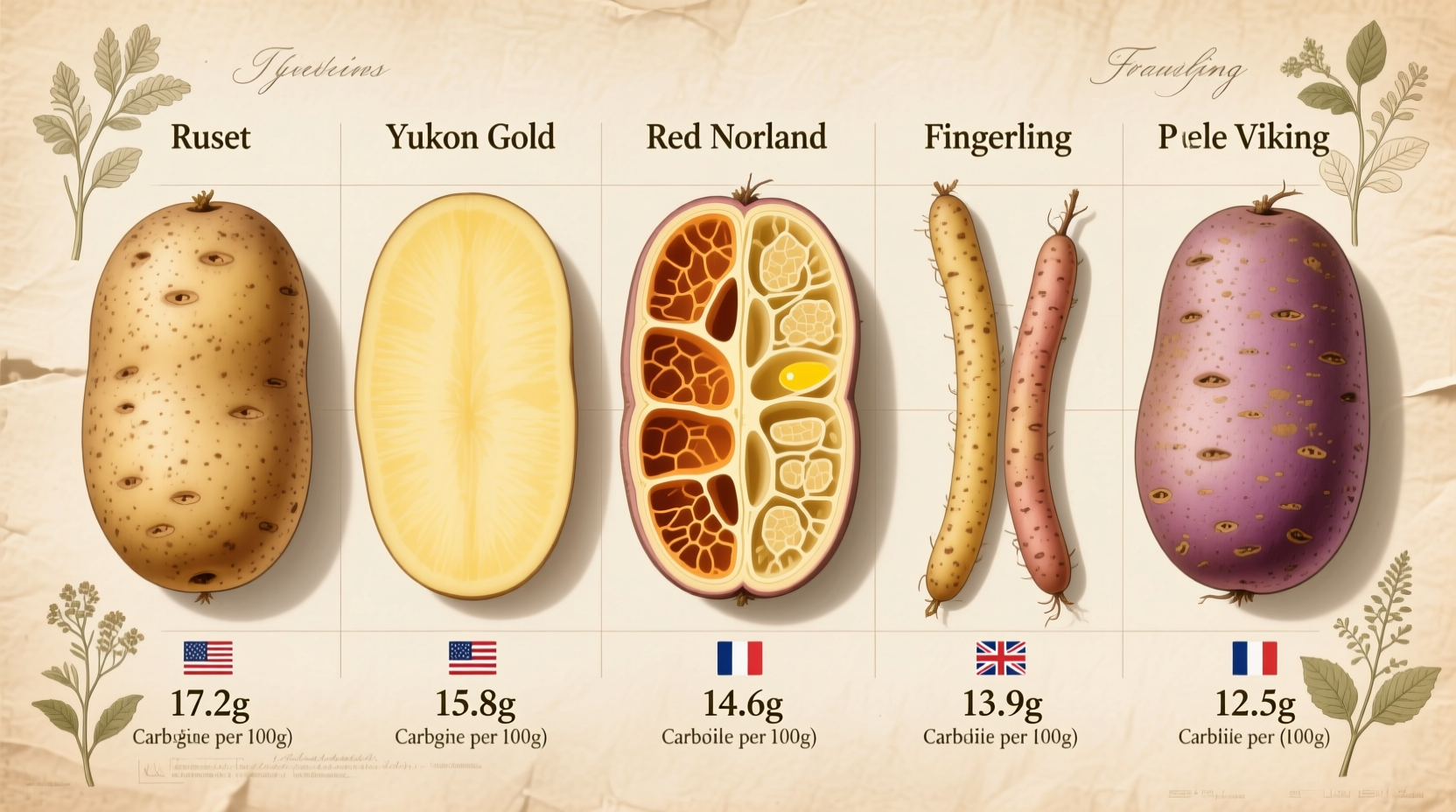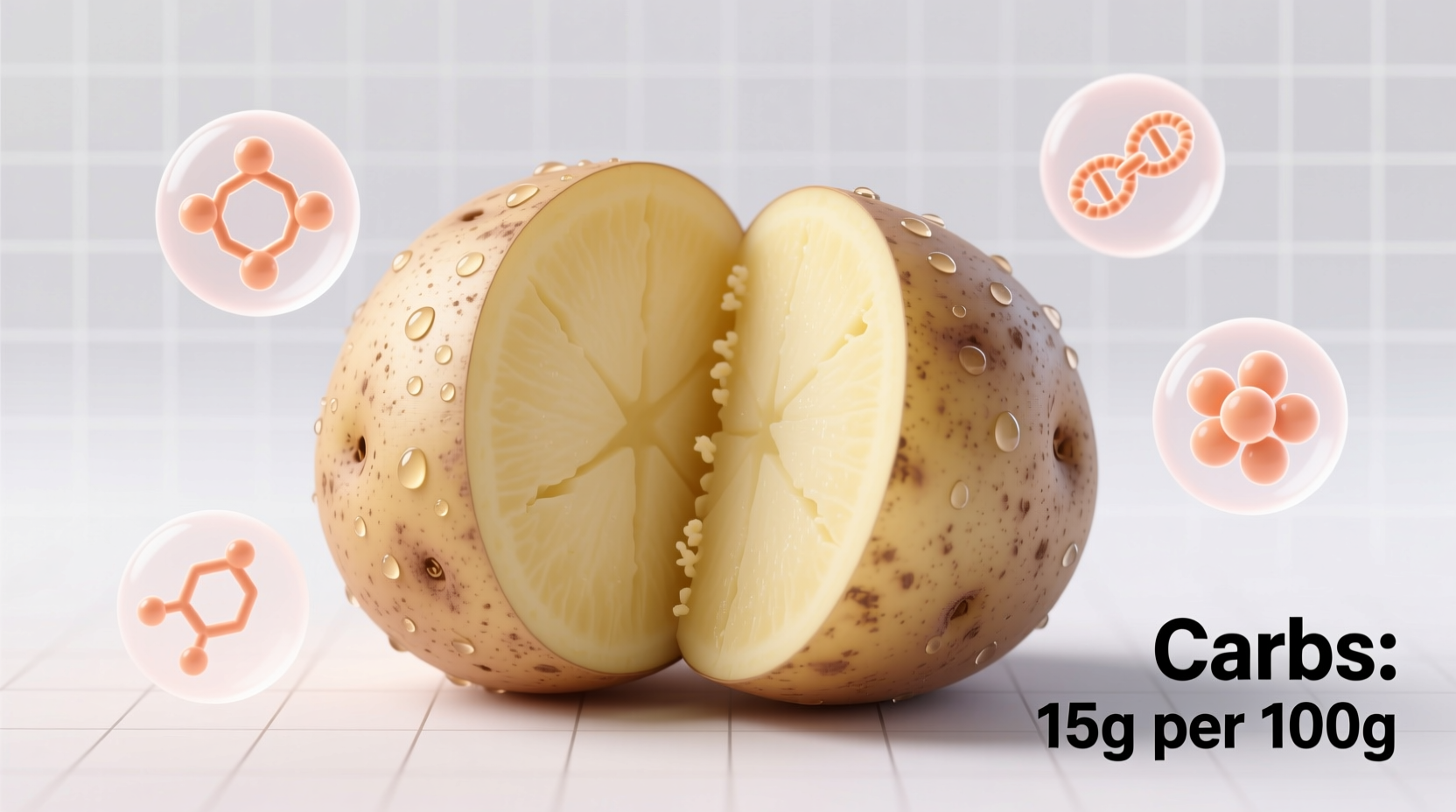One medium potato (150g) contains approximately 37 grams of total carbohydrates, with 33g starch, 3g fiber, and 1g sugar. The exact carb count varies by potato type, size, and preparation method, ranging from 15-25g net carbs per 100g serving.
Understanding the carbohydrate composition of potatoes is essential for making informed dietary choices. Whether you're managing blood sugar, following a specific diet plan, or simply curious about this staple food's nutritional profile, knowing precisely what you're consuming matters. This comprehensive guide breaks down potato carbs with scientifically verified information to help you incorporate them wisely into your eating pattern.
Breaking Down Potato Carbohydrates: What's Really Inside
When examining carbs in potato, it's crucial to understand they're not just simple sugars. Potatoes contain three primary carbohydrate components that affect your body differently:
- Starch (approximately 88% of total carbs) - The main energy source that breaks down into glucose
- Dietary fiber (about 8% of total carbs) - Supports digestive health and reduces net carb impact
- Natural sugars (roughly 3% of total carbs) - Primarily glucose, fructose, and sucrose
The specific ratio varies based on potato variety and cooking method. For instance, cooling cooked potatoes increases resistant starch content—a type of fiber that behaves differently in your digestive system.
Potato Varieties Compared: Carb Content Differences
Not all potatoes are created equal when it comes to carbohydrate composition. The following comparison shows how different popular varieties measure up:
| Potato Variety | Carbs per 100g (Raw) | Net Carbs per 100g | Glycemic Index |
|---|---|---|---|
| Russet | 17.5g | 15.9g | 85-111 |
| Yukon Gold | 16.9g | 15.3g | 70-80 |
| Red Potato | 15.9g | 14.5g | 65-75 |
| Sweet Potato | 20.1g | 17.3g | 44-60 |
Data source: USDA FoodData Central
How Cooking Transforms Potato Carbohydrates
The way you prepare potatoes significantly impacts their carbohydrate structure and how your body processes them. Understanding this carbohydrate transformation timeline helps optimize preparation for your dietary goals:
- Raw state: Potatoes contain raw starch that's difficult for humans to digest
- Cooking (gelatinization): Heat breaks down starch granules, making them more digestible and increasing glycemic impact
- Immediate consumption: Highest glycemic response as starch converts quickly to glucose
- Cooling (retrogradation): As potatoes cool, some starch reorganizes into resistant starch (2-3x increase)
- Reheating: Partially reverses resistant starch formation, but still maintains higher levels than freshly cooked
This explains why potato salad often has a lower glycemic impact than hot mashed potatoes. According to research published in the Journal of Nutrition and Metabolism, cooling cooked potatoes for 24 hours can increase resistant starch content by up to 13%.

Practical Guidance for Different Dietary Needs
Whether you're following a specific eating plan or managing health conditions, understanding carbs in potato helps you make informed choices. Consider these practical applications:
For Blood Sugar Management
People with diabetes or insulin resistance should consider:
- Choosing smaller portions (100-150g cooked)
- Opting for red or Yukon Gold varieties over Russets
- Consuming potatoes cooled or in salads to increase resistant starch
- Pairing with protein and healthy fats to slow glucose absorption
- Monitoring personal glucose response as individual reactions vary
For Low-Carb and Ketogenic Diets
While traditional potatoes don't fit strict keto parameters (typically 20-50g net carbs daily), strategic approaches include:
- Limited inclusion of small portions of cooled potatoes
- Exploring lower-carb alternatives like cauliflower or turnips
- Using potato substitutes in recipes (e.g., mashed cauliflower)
- Timing potato consumption around physical activity for better glucose utilization
For Active Individuals and Athletes
For those with higher energy needs, potatoes offer valuable complex carbohydrates:
- Ideal pre-workout meal component 2-3 hours before exercise
- Excellent post-workout recovery food when paired with protein
- Provides sustained energy release compared to simple sugars
- Naturally contains potassium and magnesium important for muscle function
Common Misconceptions About Potato Carbs
Several myths persist about potato carbohydrates that deserve clarification:
Myth: All potatoes are high glycemic and should be avoided.
Reality: While Russets rank high, red potatoes and properly prepared sweet potatoes have moderate glycemic indexes. Preparation method significantly impacts glycemic response.
Myth: Potatoes have no nutritional value beyond carbs.
Reality: Potatoes provide vitamin C, potassium, vitamin B6, and antioxidants—especially in the skin. One medium potato contains more potassium than a banana.
Myth: Sweet potatoes are always a better choice than regular potatoes.
Reality: Both have nutritional merits. Sweet potatoes contain more vitamin A, while regular potatoes provide more potassium and vitamin C. The "better" choice depends on individual nutritional needs.
Maximizing Potato Benefits While Managing Carbs
Implement these evidence-based strategies to enjoy potatoes while managing carbohydrate intake:
- Size matters: Stick to 100-150g portions of cooked potato (about the size of your fist)
- Cooling technique: Prepare potatoes in advance and cool completely before eating to increase resistant starch
- Skin on: Keep the skin for additional fiber (reduces net carbs by 10-15%)
- Smart pairing: Combine with protein (chicken, fish) and healthy fats (olive oil, avocado) to moderate blood sugar response
- Vinegar boost: Adding vinegar to potato dishes can reduce glycemic response by up to 35% according to research in European Journal of Clinical Nutrition
Remember that individual responses to carbohydrates vary significantly. The American Diabetes Association recommends personal glucose monitoring to understand your unique response to different potato preparations.
Conclusion: Making Informed Potato Choices
Understanding the complete picture of carbs in potato empowers you to make choices aligned with your health goals. Potatoes aren't inherently "good" or "bad"—their impact depends on portion size, preparation method, variety, and how they fit within your overall dietary pattern. By applying these evidence-based strategies, you can enjoy this versatile, nutrient-rich food while managing carbohydrate intake effectively.











 浙公网安备
33010002000092号
浙公网安备
33010002000092号 浙B2-20120091-4
浙B2-20120091-4